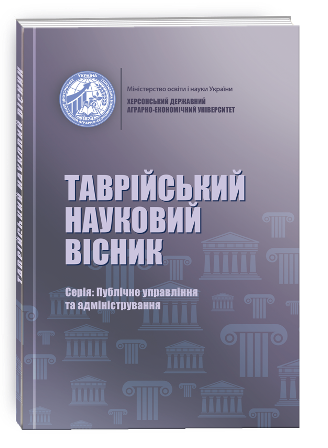THE IMPACT OF GOVERNMENT REGULATION ON THE COMPETITIVENESS OF THE TOURISM AND HOSPITALITY SECTOR
DOI:
https://doi.org/10.32782/tnv-pub.2024.5.7Keywords:
government regulation, competitiveness, tourism sector, hospitality industry, sustainable development, innovation, UkraineAbstract
This article is dedicated to exploring the impact of government regulation on the competitiveness of the tourism and hospitality sectors, with a particular focus on the Ukrainian context. The study aims to analyze various aspects of public policy and its role in fostering the development of these industries, which are essential for economic growth, job creation, and attracting investment. The article examines the main instruments of government regulation, such as licensing, quality standardization, tax incentives, environmental norms, and compliance controls, which ensure adherence to industry requirements and enhance the country’s reputation as a reliable tourism destination. Special emphasis is placed on sustainable development and innovation in the sector, which are critical factors for achieving long-term competitiveness. Sustainable development is presented as a strategy that supports environmental responsibility and cultural heritage preservation, attracting segments of eco-tourism that prioritize ethical travel practices. In addition, the article highlights the role of government initiatives in promoting the adoption of cutting-edge technologies, such as service automation and the use of renewable energy sources, which reduce costs and increase business efficiency. By analyzing both Ukrainian and international experiences, the authors outline promising directions for enhancing regulatory policies to support the development of the tourism and hospitality industries amidst global competition. The article also addresses challenges associated with government regulation, including excessive tax burdens, complex licensing procedures, and high compliance costs, which may inhibit the growth of small and medium-sized businesses. The authors investigate ways to balance the need for high standards with the creation of a favorable business environment, encouraging the growth of both local and international tourism. Recommendations are proposed for implementing effective government policies that bolster the competitiveness of Ukraine’s tourism sector through the promotion of innovation, sustainable practices, and social responsibility. The analytical approach and recommendations presented in this study are valuable for researchers, policymakers, entrepreneurs, and industry practitioners interested in developing the tourism sector and strengthening its position in the global market. This comprehensive analysis not only identifies current issues but also offers practical insights for creating a robust regulatory framework that supports sustainable growth, enhances international reputation, and aligns with evolving consumer demands for quality, sustainability, and cultural preservation in tourism and hospitality. The findings underscore that effective regulatory practices must balance economic growth with responsible management, providing a blueprint for policy enhancements that benefit both the industry and society at large.
References
Бутко М., Коробченко А. Вплив державного регулювання на розвиток туристичної індустрії в Україні // Економіка та держава. 2020. № 6. С. 98–102.
Голубєва Т. О. Стратегічні пріоритети державного управління розвитком туризму в Україні // Вісник економічної науки України. 2021. № 1. С. 62–67.
Паламарчук Л. В., Іванова О. В. Сталий розвиток та інновації у туристичній галузі: європейський досвід і перспективи для України // Журнал європейської економіки. 2019. Т. 18, № 3. С. 255–262.
Кужель В. В. Державне регулювання індустрії гостинності та його вплив на конкурентоспроможність підприємств // Економіка та управління національним господарством. 2018. № 2. С. 45–52.
Назаренко Н. І. Сталий розвиток туристичних послуг: роль державного регулювання // Сучасні проблеми економіки і права. 2019. № 3. С. 55–61.
Лисенко А. О., Харченко С. С. Державне регулювання туристичної галузі як фактор соціально-економічного розвитку регіонів // Регіональна економіка. 2021. № 4. С. 78–85.
Smith M., Puczkó L. Health, Tourism and Hospitality: Spas, Wellness and Medical Travel. Routledge, 2014.
Buhalis D., Costa C. Tourism Management Dynamics: Trends, Management and Tools. Elsevier, 2006.
Pechlaner H., Volgger M. How to promote cooperation in the hospitality industry: Generating practitioner-relevant knowledge using the GABEK qualitative research strategy // International Journal of Hospitality Management. 2012. Vol. 31, No. 3. P. 579–588.
Hall C. M. Tourism Planning: Policies, Processes and Relationships. Pearson Education, 2008.
Кирилов Ю. Є., Грановська В. Г., Алєщенко Л. О. Економічний механізм формування конкурентних переваг суб’єктів туристичної галузі // Міжнародний науково-практичний журнал “Економіка АПК”. 2020. № 5. С. 45.
Крикунова В. М., Алєщенко Л. О. Стратегічні пріоритети розвитку молодіжного підприємництва у Херсонському регіоні в сфері туристичного бізнесу // Таврійський науковий вісник. 2020. № 4.







